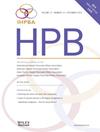Unraveling the obesity paradox in hepatocellular carcinoma: relative role of elevated body mass index on detrimental effects of postoperative complications
IF 2.4
3区 医学
Q2 GASTROENTEROLOGY & HEPATOLOGY
引用次数: 0
Abstract
Background
The “obesity paradox” suggests higher body mass index (BMI) may correlate with better long-term outcomes in cancers. The impact of BMI on hepatocellular carcinoma (HCC) resection, regarding postoperative complications, remains unclear. We examined the interplay between BMI and complications on recurrence-free survival (RFS) among patients undergoing HCC resection.
Methods
Patients undergoing hepatectomy for HCC (2000–2023) were identified from an international database. Kaplan-Meier and Cox analyses assessed the protective impact of high BMI on RFS, considering interactions with complications.
Results
Among 1,588 patients (median BMI: 25.2 kg/m²; BMI > 25.0:793, BMI ≤ 25.0:795), 560 (35.3%) experienced complications. BMI > 25.0kg/m² was linked to better 5-year RFS than BMI ≤ 25.0kg/m² (50.3% vs 45.4%; p = 0.006). Patients without complications had better 5-year RFS than those with complications (51.7% vs 40.7%; p < 0.001). Among patients without complications, RFS was comparable among BMI groups (52.9% vs 50.6%; p = 0.215), but among patients with complications BMI > 25.0kg/m² was associated with better RFS (45.6% vs 34.2%; p < 0.001). Patients with complications and BMI > 25.0 kg/m² had RFS comparable to patients without complications, regardless of BMI. Multivariable analysis identified complications (HR:1.31 [1.08–1.60]; p = 0.007) as a predictor of worse RFS, while BMI > 25.0 kg/m² (HR: 0.79 [0.68–0.96]; p = 0.020) was protective. Spline analysis demonstrated recurrence risk declined with increasing BMI among patients with complications, crossing below 1 around 25.0kg/m². Stratifying the complication cohort (BMI ≤ 25.0/25.0–30.0/>30.0 kg/m²) demonstrated dose-dependent RFS improvement (p = 0.005).
Conclusion
High BMI correlated with better RFS following HCC resection among patients with complications. Concerns about complications should not deter surgery among high-BMI patients.
揭示肝癌患者的肥胖悖论:体重指数升高对术后并发症不利影响的相对作用
背景:“肥胖悖论”表明,较高的身体质量指数(BMI)可能与更好的癌症长期预后相关。BMI对肝细胞癌(HCC)切除术的影响,关于术后并发症,尚不清楚。我们研究了在接受肝细胞癌切除术的患者中BMI和并发症对无复发生存(RFS)的相互作用。方法:从国际数据库中确定2000-2023年接受肝切除术的HCC患者。Kaplan-Meier和Cox分析评估了高BMI对RFS的保护作用,并考虑了并发症的相互作用。结果:1588例患者(BMI中位数:25.2 kg/m²;BMI≤25.0:793,BMI≤25.0:795),560例(35.3%)出现并发症。BMI≤25.0kg/m²比BMI≤25.0kg/m²与更好的5年RFS相关(50.3% vs 45.4%;P = 0.006)。无并发症患者的5年RFS优于有并发症患者(51.7% vs 40.7%;P < 0.001)。在无并发症的患者中,RFS在BMI组之间具有可比性(52.9% vs 50.6%;p = 0.215),但在有并发症的患者中,BMI为25.0kg/m²与较好的RFS相关(45.6% vs 34.2%;P < 0.001)。无论BMI如何,有并发症且BMI为25.0 kg/m²的患者的RFS与无并发症的患者相当。多变量分析发现并发症(HR:1.31 [1.08-1.60];p = 0.007)是较差RFS的预测因子,而BMI为25.0 kg/m²(HR: 0.79 [0.68-0.96];P = 0.020)具有保护作用。样条分析显示,并发症患者的复发风险随着BMI的增加而下降,在25.0kg/m²左右交叉于1以下。并发症队列分层(BMI≤25.0/25.0-30.0/>30.0 kg/m²)显示出剂量依赖性RFS改善(p = 0.005)。结论:高BMI与HCC术后并发症患者较好的RFS相关。对并发症的担忧不应阻止对高bmi患者进行手术。
本文章由计算机程序翻译,如有差异,请以英文原文为准。
求助全文
约1分钟内获得全文
求助全文
来源期刊

Hpb
GASTROENTEROLOGY & HEPATOLOGY-SURGERY
CiteScore
5.60
自引率
3.40%
发文量
244
审稿时长
57 days
期刊介绍:
HPB is an international forum for clinical, scientific and educational communication.
Twelve issues a year bring the reader leading articles, expert reviews, original articles, images, editorials, and reader correspondence encompassing all aspects of benign and malignant hepatobiliary disease and its management. HPB features relevant aspects of clinical and translational research and practice.
Specific areas of interest include HPB diseases encountered globally by clinical practitioners in this specialist field of gastrointestinal surgery. The journal addresses the challenges faced in the management of cancer involving the liver, biliary system and pancreas. While surgical oncology represents a large part of HPB practice, submission of manuscripts relating to liver and pancreas transplantation, the treatment of benign conditions such as acute and chronic pancreatitis, and those relating to hepatobiliary infection and inflammation are also welcomed. There will be a focus on developing a multidisciplinary approach to diagnosis and treatment with endoscopic and laparoscopic approaches, radiological interventions and surgical techniques being strongly represented. HPB welcomes submission of manuscripts in all these areas and in scientific focused research that has clear clinical relevance to HPB surgical practice.
HPB aims to help its readers - surgeons, physicians, radiologists and basic scientists - to develop their knowledge and practice. HPB will be of interest to specialists involved in the management of hepatobiliary and pancreatic disease however will also inform those working in related fields.
Abstracted and Indexed in:
MEDLINE®
EMBASE
PubMed
Science Citation Index Expanded
Academic Search (EBSCO)
HPB is owned by the International Hepato-Pancreato-Biliary Association (IHPBA) and is also the official Journal of the American Hepato-Pancreato-Biliary Association (AHPBA), the Asian-Pacific Hepato Pancreatic Biliary Association (A-PHPBA) and the European-African Hepato-Pancreatic Biliary Association (E-AHPBA).
 求助内容:
求助内容: 应助结果提醒方式:
应助结果提醒方式:


